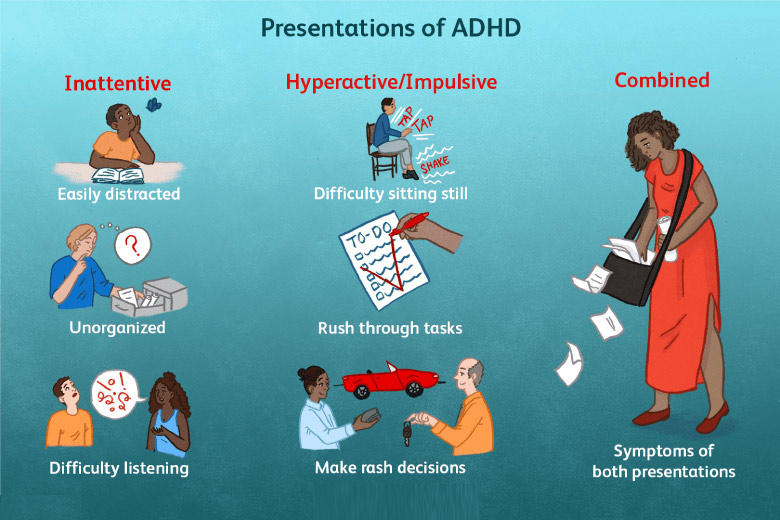
10 Problems That Could Mean Adult ADHD
It is not difficult to diagnose ADHD (attention deficit hyperactivity disorder) in children. But the adults have more subtle symptoms of ADHD. It means most adults struggle with the disorder even without knowing it. They don’t realize that the issues they are facing are related to ADHD.
Here are 10 potential symptoms of ADHD in adults:
Top 10 symptoms
Sign No. 1: Issues with Organizing
The responsibilities of adulthood, like jobs, children, bills, bank account, etc. can have a problem with the organization. This is more likely to be problematic than in childhood.
Sign No. 2: Careless Driving and Road Accidents
People who have ADHD can’t keep their attention focused on a task, so driving and operating heavy machinery can be hard. Symptoms of ADHD make people speed up, lose their driving license, or have road accidents.
Sign No. 3: Marital Problems
A troubled marriage cannot be a red flag for ADHD, as many people without ADHD also have marital issues. But there are specific problems that affect the married life of those with ADHD. Often, partners of people with undiagnosed ADHD report an inability to honor commitment and poor listening skills. A person with ADHD does not understand why the partner is upset and may feel that the partner is blaming him/her for something that’s not his/her fault.
Sign No. 4: Extreme Distraction
ADHD is an attention disorder, so it can make it hard for people to succeed in today’s fast-moving, hustle-bustle world. Many people reported that distractibility leads to a history of career underperformance, especially in busy or noisy offices. People with adult ADHD might find that emails or phone calls derail their attention, making it hard for them to finish tasks.
Sign No. 5: Bad Listening Skills
Did your spouse forget to pick up your child from school, even though you called or texted to remind them? Do you often zone out during tedious business meetings? Attention problems result in poor listening skills in adults with ADHD, leading to misunderstandings and missed appointments.
Sign No. 6: Uneasiness or Restlessness
Children with ADHD are usually hyperactive. However, adults with ADHD have different symptoms. Rather than bouncing off the walls and running on the ground, ADHD adults are more likely to be uneasy or restless. If a person has ADHD, people will describe him as edgy or tense.
Sign No. 7: Trouble Beginning a Task
Adults with ADHD often step down when starting a task that requires a lot of attention just as children with ADHD put off doing homework. The procrastination adds up to existing problems of workplace issues, marital disagreements, and issues with friends and family.
Sign No. 8: Unpunctuality
There are many reasons for the lateness of ADHD adults. Firstly, they are often distracted on their way, maybe noticing they are low on gas or their car needs washing, etc., and before they know, an hour has gone by. People with adult ADHD tend to underestimate how much time a task will take to finish, whether it’s a simple home repair work or a big assignment at the office.
Sign No. 9: Anger Outbursts
ADHD causes problems with emotion control. People with adult ADHD quickly explode over minor issues. Often, they feel they have no or little control over their emotions. Most of the time, anger flares and fades very quickly, long before people dealing with the outburst get over the incident.
Sign No. 10: Issues in Prioritizing
Adults with ADHD often miss-prioritize things. They fail to meet obligations like a work deadline due to this problem. ADHD adults tend to spend countless hours on something insignificant or less important.
Getting Diagnosed
If you have the symptoms mentioned above, get examined by an experienced mental health professional. ADHD in adults can be hard to diagnose because its symptoms like poor listening skills, relationship problems, poor motivation or concentrating, can also be a sign of some other condition. Substance abuse or depression also have similar signs and symptoms. So, it is necessary to get diagnosed. Once you get diagnosed, you will have adequate help and start feeling better.
